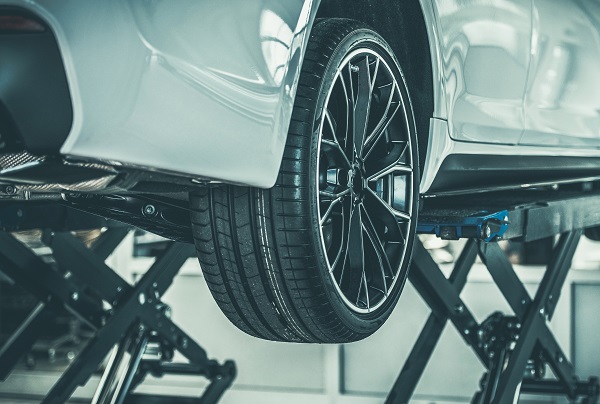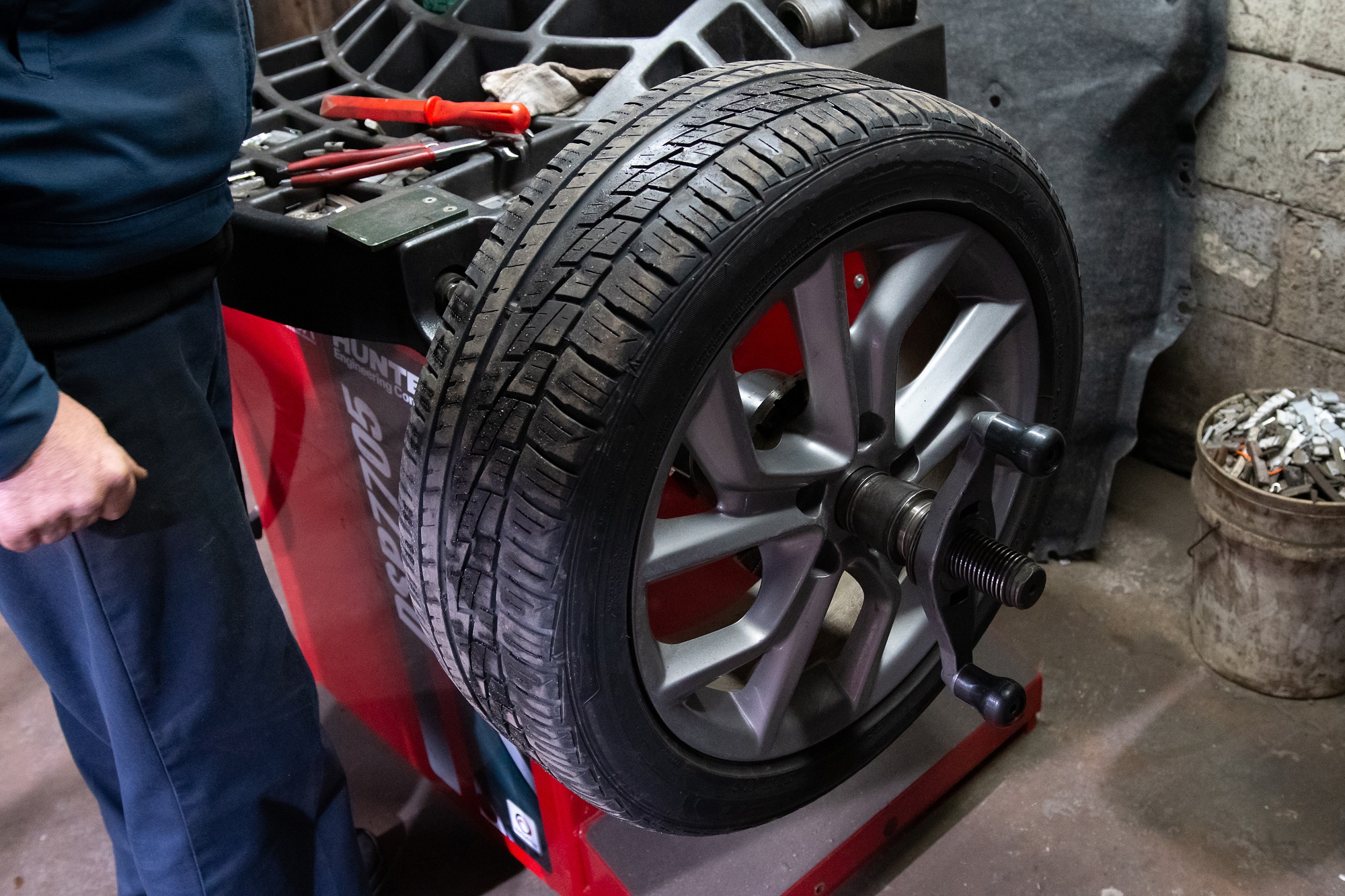Essential Signs and Guidelines to Keep Your Ride Smooth and Safe

You should schedule tire balancing services every 6,000 to 8,000 miles or every six months to maintain optimal vehicle performance. It’s especially important after installing new tires, completing suspension repairs, or rotating your tires. Pay attention to signs like vibrations in the steering wheel, uneven tire wear, or a vehicle that pulls to one side, as these can indicate balancing issues. Addressing these symptoms promptly can enhance your vehicle’s safety and handling. Properly timed tire balancing at your local alignment shop at Springs Brake and Suspension integrates seamlessly into regular maintenance, promoting a smoother ride. There’s more to consider for effective tire health and performance.
Importance of Tire Balancing
Tire balancing plays a crucial role in ensuring your vehicle operates smoothly and safely. By maintaining even weight distribution around the wheels, tire balancing prevents vibrations and uneven wear, which can compromise your driving experience.
Regular tire balancing is essential, as it’s recommended every 6,000 to 8,000 miles or every six months. This practice not only enhances vehicle handling but also extends the life of your tires, ultimately saving you money on premature replacements.
If you’ve recently installed new tires, balancing is crucial for optimal performance. Additionally, if you frequently drive on rough roads, consider more frequent checks to address any potential imbalances early.
Prioritizing tire balancing improves fuel efficiency and overall vehicle safety.
Do You Need Alignment or Tire Balancing Services?
Don’t wait—schedule your alignment or tire balancing service appointment today! Schedule your $125 alignment today, and enjoy a smoother, safer driving experience!
Signs You Need Balancing
Proper tire balancing directly influences vehicle performance, and recognizing the signs that indicate a need for balancing is vital.
Ignoring these signs can lead to uneven tire wear and reduced vehicle efficiency. Here are some key indicators that you need tire balancing:
- You feel vibrations in your steering wheel or seat at certain speeds.
- Uneven tire wear patterns, like cupping or scalloping, are present.
- You hear humming or roaring noises from the tires while driving.
- Your vehicle pulls to one side or the steering wheel is off-center when driving straight.
Addressing these signs promptly won’t only enhance your driving experience but also extend the life of your tires and improve fuel efficiency.
Frequency of Tire Balancing
Regular tire balancing is essential for maintaining optimal vehicle performance and safety.
It’s recommended to schedule tire balancing every 6,000 to 8,000 miles or every six months. If you frequently drive on rough or uneven surfaces, consider more frequent checks.
Addressing symptoms like vibrations in the steering wheel or uneven tire wear promptly will help you avoid costly repairs. Integrating regular balancing into your tire maintenance schedule enhances tire longevity and improves overall vehicle handling.
Whenever you install new tires or perform suspension work, balancing is crucial to ensure even weight distribution and stability.
Consistent tire balancing not only ensures a smoother ride but also contributes to safer driving conditions.
Don’t overlook this vital aspect of vehicle upkeep.
After New Tire Installation
After installing new tires, scheduling tire balancing is crucial for ensuring even weight distribution and optimal vehicle performance.
New tires often come with uneven weight distribution due to manufacturing imperfections, making this step essential.
Here are four reasons to prioritize tire balancing after installation:
- Prevents Vibrations: Balancing eliminates vibrations in the steering wheel, enhancing comfort.
- Enhances Handling: Properly balanced tires improve steering response and overall handling.
- Maximizes Tire Lifespan: Regular balancing helps prevent premature wear, extending the life of your new tires.
- Ensures Safety: Balanced tires contribute to safe driving conditions, reducing the risk of accidents.
Following Suspension Repairs
Ensuring optimal vehicle performance requires scheduling tire balancing services following any suspension repairs.
After such repairs, the adjustments made can affect your vehicle’s weight distribution and alignment, potentially leading to uneven tire wear and compromised handling.
It’s crucial to schedule tire balancing immediately to maintain vehicle stability. By addressing this proactively, you can prevent issues like vibrations and enhance your overall driving experience.
Even if you don’t notice any immediate symptoms, checking tire balance after suspension work is a smart move.
This proactive maintenance not only prolongs tire lifespan but also ensures safer driving conditions.
Don’t overlook the importance of balancing your tires post-repair; it’s vital for optimal performance and safety on the road.
When Rotating Tires
Tire rotation presents an ideal opportunity for balancing, particularly because it should occur every 6,000 to 8,000 miles.
Combining tire balancing with rotation maximizes efficiency and helps maintain vehicle safety and driving comfort. Here are some key reasons to consider balancing when rotating your tires:
- Even Weight Distribution: Balancing ensures tires wear evenly, preventing uneven tread wear.
- Vibration Prevention: If you feel vibrations while driving, it may indicate a need for balancing.
- New Tire Installation: Always balance new tires immediately after installation to enhance performance.
- Suspension Protection: Regular balancing during rotation protects your vehicle’s suspension system from unnecessary stress.
Uneven Tire Wear Indicators
Noticing uneven tire wear can indicate underlying issues with your vehicle’s alignment or balance. If you see bald patches or excessive wear on one side of your tires, it’s a clear sign that alignment needs attention.
Additionally, if your steering wheel feels crooked or vibrates, especially at higher speeds, it may suggest problems with both alignment and balancing. Your vehicle pulling to one side while driving straight is another indicator that your tires aren’t properly aligned, which can lead to premature tire wear and compromise safety.
Addressing these issues promptly not only enhances your driving experience but also prolongs the life of your tires. Regular checks can prevent serious issues and ensure optimal performance.
Bring Your Car to Springs Brake and Suspension for Regular Tire Balancing
For optimal vehicle performance and safety, it’s essential to bring your car to Springs Brake and Suspension for regular tire balancing.
This maintenance service helps ensure even weight distribution and prevents vibrations while driving.
Here’s when you should consider scheduling tire balancing:
- Every 6,000 to 8,000 miles or every six months.
- After installing new tires or completing suspension work.
- When you notice vibrations in the steering wheel or unusual noises.
- If you frequently drive on rough roads or hit potholes.
Auto repair services we provide
- Suspension Services in Brush Prairie: Our suspension services ensure that your vehicle’s ride quality and handling are optimized.
- Lift Kit Installation in Brush Prairie: Enhance your vehicle’s off-road capability and aesthetics with our professional lift kit installation.
- Power Steering Repair in Brush Prairie: Our power steering repair services diagnose and fix issues with your steering system.
- Brake Repair in Brush Prairie: Our inspections and maintenance can help identify worn-out brake pads, damaged rotors, or fluid leaks before they lead to more significant issues.
Meet the Owner: Sean Miller

Sean Miller is the dedicated owner of Springs Brake and Suspension, a local auto repair shop known for its exceptional service and expertise. Prior to acquiring the business, Sean gained valuable experience working with Fortune 500 companies and federal governments, developing innovative business models, while also running a successful auto detailing venture as a hobby. His strong business skills and a genuine commitment to customer satisfaction have made Springs a go-to spot for both car enthusiasts and everyday drivers. Outside of work, Sean enjoys attending car shows, exploring new automotive technologies, and mentoring aspiring entrepreneurs, all of which reflect his relentless passion for the automotive industry. At Springs, he applies his extensive knowledge and hands-on management style to optimize operations and enhance customer interactions, ensuring that every client feels valued and informed about their vehicle needs. With a focus on efficiency and service excellence, Sean fosters a welcoming environment, cultivating a community of satisfied customers who trust Springs Brake and Suspension for all their automotive requirements.
Do You Need Alignment or Tire Balancing Services?
Don’t wait—schedule your alignment or tire balancing service appointment today! Schedule your $125 alignment today, and enjoy a smoother, safer driving experience!

